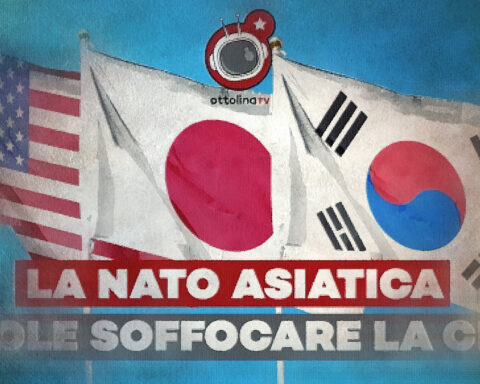As we know, dialectical materialism indicated that: materials determine the consciousness, social existence determines social consciousness. Thus, the reality of life will actually formulate the program and content of our training. Anghen said: the requirements of reality is as valuable as dozens universities’ teachings. This is truly correct to Vietnam. It was the real life requirements of the society that has spurred the renewal process in Vietnam, not because any single university introduced this idea. Training based on mandatory requirements and provide rooms for training institutions to adjust and change the programs, methodologies, objectives as well as subjective… will make universities more adaptable. Training based on the needs is also facilitating the competition among training institutions: To response to the demand of the society, the demand of those enterprise in need of employees … there will be more human resources providers, therefore, a higher quality of human resource will be available. According to a study the quality of education in Vietnam is not homogeneous1: quality of schools and teachers is not homogeneous in different training institutions. Even in the same university, quality of lecturers also differs from one to another. The selection of students has different difficulties. So what we need to do is to create competition in education sector.
Recently, training based on society’s demand in Vietnam has been raised and discussed exactly. Since 2008, the Government, the Ministry of Education and Training, the Universities have organized many seminars on this topic. This is an important national issue. However, the definition of training based on society’s demand remains a big unanswered question. How universities could know the demands of the society for each profession in order not be exceeding or in a shortage situations ; what type of human resource would the society need and how is their qualities… are still the problems need to be further discussed. Although there are different opinions, however, most agree that as Vietnam has switched to socialist-oriented market economy, the training based on society’s demand becomes more urgent than ever, and play a vital role in our country’s education.
From economic point of view, as the he society is transitioning from old-fashioned agriculture to modern industrial production, the demand for knowledge and management is increasing high, the training based on the society’ and economy requirements are becoming necessary than ever. As the country moved into the market mechanism, the universities have started a policy of the training based on what the social needs, not on what the school posses. However, what and how much the society needs remain unknown even to the Ministry of Education and Training. Deputy Prime Minister Nguyen Thien Nhan said that in Vietnam the forecasting and estimation have not done quite well, there is not been a good strategy on human resources, the provision of labors is imbalanced. One thing should be noted is that training based on the demands of different sectors even not yet be touched upon. Therefore, workshops on this issue is needed.
Reality shows that in Vietnam, many institutions that implementing training based on demands has developed rapidly, their products are received positively by society…. Not only in Vietnam, many countries around the world that applied “training based on demands” also had gained very positive results.
Reality of Training in Vietnam
Vietnam has for a long time applied the training model which focuses heavily on theory and academics, but lack of practical application, not linked to real life. The students know everything, but nothing profound. A survey showed that 80% of students do not fully understand the theory they learnt. For example, when studying of mercantilism, many students can memorize all, but if they are asked about the main ideas of mercantilism, some students can not summarize. That’s not to mention the application into practice. Students learn theory without knowing what they have learned to do, where to use, because the school has not make surveys on the needs of society, the labor market, the requirements of businesses before formulating the training program and subjects.
With regard to the application of knowledge into practice: Many agreed that the internship period is too short. After the internship, many students complaint that this period is usually short and not enough to reach out to practice and to apply the knowledge they have learned. Sometimes internship is in fact a “sight-seeing”, causing a waste of time and effort. Meanwhile, many businesses have not create favorable conditions for students to intern and even refused to accept students intern because of many different reasons. Schools and businesses have not yet collaborated well in training students. The ministry has yet to have a regulation on the responsibility of the businesses in advising intern students.
The above situation leads to the fact that recently, when a company employs a graduated student, he/she has to be retrained because of his/her basic knowledge is not met the requirements. These students perform badly in both theory and practice. Approximately 70% of knowledge learned in school can not be used. Some software businesses needs to retrain 80% – 90% of students new recruited for at least 1 year. According to a survey results of the World Bank, in Vietnam, about 60% of young workers graduated from vocational schools and colleges need to be retrained immediately after recruitment2. On the other hand, there is a particular surplus and deficit between the type of profession. Statistics show that training in economics and managerial sectors accounts for 30 % of total students, while that of industrial – engineering sector accounts for only 15%. Therefore, so many graduates with excellent degree and still remain unemployed. In contrary, there are still areas due to lack of manpower, so we had to use the low quality students.
In this circumstance, there is a fact that some other institutions in running after the market demand, they provide short-term training according to social tendency without any policy or strategy. They operate the schools to meet the immediate requirements without the long-term plan, or investment in training the lecturers in order to create quality human resources to meet the demands of reality.
About the lecturers: most of them possess insufficient practical knowledge. There are many teachers throughout the year teaching in class and do not have time for field trips, or just practice slapdash. For example, lecturer of the stock market subject but never once participate in securities exchanges; teaching about audit but has never participated in the auditing; teaching about agricultural economic management, but never go the farms and cooperatives… Of course, in order to participate in practice, there are certain difficulties, but by no means impossible. In addition, there are many ways to participate in reality… for example through research documents, records, through the exchange of personal experience, participation in workshops, seminars …
About the students: Many students do not know the career orientation prior to university. Students choose their major field emotionally, without understanding whether it suits him or not. Many people choose economics because they think it would be easy to find a job with high income… without regarding of their abilities and learning conditions… The career orientation has not been given enough attention. The learners follow the crowd mentality. So recently a number of training programs are really overloaded, causing great waste, while some other programs must stop training due to lack of students. In the learning process, many students have not really strive for learning and training. Thus, even the theoretical issues being taught in school, they did not understand. At the same time, many student do not link to practice and business… for example, Vietnam’s stock market has been in operation and there are update information every day, but how many students have noticed and follow those information? Or waiting until graduation and then starting to learn about the Vietnam’s stock market.
At the macro level, the Ministry of Education and Training set a target of student number to be trained every year for schools, based on lecturers’ capacity and infrastructure of the school. The Ministry is supposed to catch up the social demand in order to determine enrollment targets, so that the new training is highly effective. Thus, until now, Vietnam has yet to come up with reliable information about the labor market forecasting and social demands.
In fact, Vietnam has been integrating with the world’s economy, the rapid pace of development. Meanwhile the world’s economy is constantly changing. So, if not attached to reality, the trained labors will not meet the requirements and will not be suitable for the jobs… Therefore, it is said that there should be a “isosceles triangle” between school – business – students in creating products that meet the requirements. Training as demand is an objective necessity.
To improve the efficiency of training based on needs in Vietnam, we need to look at the following issues:
Training must be linked to reality: Learn the characteristics of reality is to best serve the needs of society. Vietnam’s economy is diverse and rich, consisting of many components, different areas and different scale as well. The form of organization of production is very diverse. On the other hand, these characteristics also constantly fluctuating …. therefore it is necessary to learn these traits. Base on that the institutes will come up with new paradigm, goals, training methods accordingly. Recently, there has been coordination between schools and businesses in the training of human resources to meet the actual needs of the society. However, the coordination of this initiative is still very limited.
Training only occupations that society needs, not to be excesses and wasted. Thus, the training facilities need to capture the needs of society, based on needs to determine the annual enrollment targets for each field. Regarding studying field, in the economics profession basically the training is corresponding to the reality, but the numbers is still difference. For example, most of the training institution in economics always have specialization in accounting and business administration. However, In reality, how many bachelors of these specialization have to work in specialization differ from their training… ?
Training as society’s demand is to train students who meet the requirements of human resources employers. Therefore, the output standards of the university must be consistent with businesses’ demands. For example, a bachelor’s degree in international economics (financial, international trade…) necessarily to have knowledge of foreign languages, informatics at a certain level. It is compared that the social needs is a machine comprising of many parts. The school must be the creator of different parts of that machine, so that when assembled on it will work effectively. We can link between departments, research centers, and production, sales agencies…
Building an effective training program. According to the assessment, training program is an important factor affecting the quality of education, but many schools’ programs are not based on market survey, training needs analysis, professional and standards of competence; so it has yet to develop an appropriate training program. Observations showed that the prestigious training institutes are based on and completed under the direction associated with the practical production, the actual needs of the society, of the company and enterprises. We have to regularly update the economy’s content and knowledge to catch up with reality. We also have to reform higher education in order to meet market demands. This is a regular work of universities not only in Vietnam, but also around the world.
In the training program, besides specialized subjects, students should be able to choose other subjects of their desire, so the learners themselves can feel adapt their study to the reality. In each subject exercises or discussion section should be given more time. In the practical training there should be goals and specific requirements to be achieved. During the internship, practicing is mandatory to students. The self-learning, self – studying should be placed under the supervision and inspection of teachers.
Training in sectors such as agriculture, rural areas need to be enhanced, because this is the reality of Vietnam, both immediate and long term. Besides the purely technical sectors we need to train inter-sectored such as economics – techniques, through which graduates will have more complete and balanced insights and assessment of those activities.
In the learning process, if students discover their majors are not suitable or not compatible with their abilities, or students detect changes in the labor market, the school should consider to allow students to change their specialization. making changes for students. Of course, the conversion course must be tightly controlled to ensure quality after transforming the major study. Currently there are no regulations on the poor quality of training standards and how to resolve this problem. So every year no school is able to report their quality of training. Ministry of Education and Training should set the rules and the standard to which training must meet social requirements.
Lecturers are leading factors to improve the quality of training. To carry out training as demanded, this is especially important. Therefore, the teaching staffs need to be improved, both in theory and practice areas. Trainers need to be accessible to scientific and technological progress of the world, to meet the increasing demand both in theory and practice. The school should allocate a time for lecturers to study the actuality each year approximately 1 month. Encourage the inviting businesses to give lectures to students, to contribute to the training program, because they know what students need and still lack of. Experience and knowledge of the company directors, chief accountants or bank leaders… are very valuable lessons, which will help students to approach practical effectively.
To be able to train as social demanded effectively, it is also responsibility of the learners. Previously when students graduate, they can rely on the assignment of the school, the support of family, then in this new paradigm, the students are the ones who decide their career positions. Therefore, they must have a new posture and behavior, even in the learning process. First and foremost is the energy and determination of students. This is a strong motivation to students who can achieve the best opportunities. Next, students must be aware of changes. Learn to work, not to get the degree. If students want to get social recognition, they must honor the self-study, self- rising. At the same time, students must find the effective method of learning, to be able to turn the training process to the self-learning process. Active learning methods have been shown by proactively short term and long term plans for themselves. Along with the theoretical content, students must actively find about facts, associated with the actual argument. For example, when studying for inflation, this theory should be linked to inflation in the world and in Vietnam. As for the study of trade barriers, students need to understand the nature of U.S. taxes on Vietnam ‘s seafood …
We need to enhance state role in the implementation of training as demanded. In the opinion of many training institutions, the State should have had more robust solutions, to enable them to improve the quality of education to meets the requirements of business and society. On the other hand, due to the inadequacies of the education system as training time, types of schools, institutes, programs, diplomas and certificates… this creates the overlap, duplication of training, thus making training less closely linked with social needs. On economics perspective, the education market is not perfect, there are many uncertainties. Therefore , state intervention in the market is essential – it needs a “conductor”- which is the state in this case to control and making adjustment to this market. Currently, the Government established the National Steering Committee on the training as society’s demand3. Ministry of Education and Training has developed a national action program of training associated with social needs. However, many more need to be done for the implementation to link between training and manpower needs of business and society.
One of the important policies is financial: the state should have the solution to solve problems like the laboratory, the practice facility; Land policies for universities and colleges; financial policy for education institutions according to the needs of society; financial autonomy of universities, colleges… Moreover, in Vietnam there are many poor people, they do not have the ability to afford all the study expenses. Therefore, the state needs to develop the capital market for student loans, or scholarships for poor students who perform well in school. In fact when the society requires a new demand, it is necessary to open a new field of study. This involves regulations and laws. Therefore, the state, specifically the Ministry of Education and Training must also be responsible in this process, allowing schools to open various branches, to compete with each other, allow international schools to open bases in Vietnam to stimulate competitiveness in training and education in the country. On the other hand, the Ministry of Education and Training programs should loosen the frame, enabling the school to take the initiative in arranging the schedule, to be able to use the excellent staff who have experiences in training. The State should also establish social demand forecast Department, from the central to local levels. Local authorities are responsible for establishing a network of information systems, helping localities to develop human resources in every stage.
In addition to the state, businesses need to invest in education as well. Indeed, enterprises do not need to contribute directly for education, but by paying taxes to the state budget. Then, the state will invest in education. Training as society’s demand means that businesses, organizations and companies order the school under the method of contracting. Responsibility of training does not only belong to the school, but to business and organizations as well. In this process, the business should have feedback about the quality of training and human resource requirements, and well as financial support for the schools, at a cost of about 2-3% production cost. Enterprises should participate in the training process, helping intern students, participate in school councils, establish vocational school in the enterprises. Businesses need to understand that their participation in training is for their own benefit. Business should not simply use “product”, but also contribute to the school along with reviews for the training program, open in-depth seminars for students. Training institutes should regularly consult enterprises for quality of graduates and their requirements of the “product” of the school.
Nguyen Van Lich
Assoc. Prof, PhD Diplomatic Academy of Vietnam
References
- Đào tạo theo nhu cầu xã hội của các ngành
http://hoithao.hcmuaf.edu.vn/contents.php?ids=1870&ur=hoithao
- Đào tạo nhân lực & nhu cầu xã hội: giải pháp nào cho “cung- cầu” gặp nhau?
http://hoithao.hcmuaf.edu.vn/contents.php?ids=2106&ur=hoithao
- Đào tạo theo nhu cầu xã hội: Cần 1 “tam giác cân”
http://www.tin247.com/dao_tao_theo_nhu_cau_xa_hoi_can_1_%E2%80%9Ctam_giac_can%E2%80%9D-11-63315.html
- Đào tạo theo nhu cầu xã hội: “Người học phải biết tự giải cứu”
http://vneconomy.vn/64511P5C11/dao-tao-theo-nhu-cau-xa-hoi-nguoi-hoc-phai-biet-tu-giai-cuu.htm
- Investigator Training Requirements for the SBS IRB
http://sbsirb.uchicago.edu/page/investigator-training-requirements-sbs-irb
- The role, contribution and training requirements of
specialist social workers http://www.ssiacymru.org.uk/media/pdf/h/g/Spec.SWs_Role_%28Revised%29.pdf
- Thế nào là đào tạo theo nhu cầu xã hội?
http://www.google.com.vn/giaidap/thread?tid=2ce57987f63bf515
-
Tiếp tục đẩy mạnh đào tạo theo nhu cầu xã hội
http://www.tinmoi.vn/Tiep-tuc-day-manh-dao-tao-theo-nhu-cau-xa-hoi-1248583.html
-
Training requirements for social service personnel.



















Il CeSE-M sui social